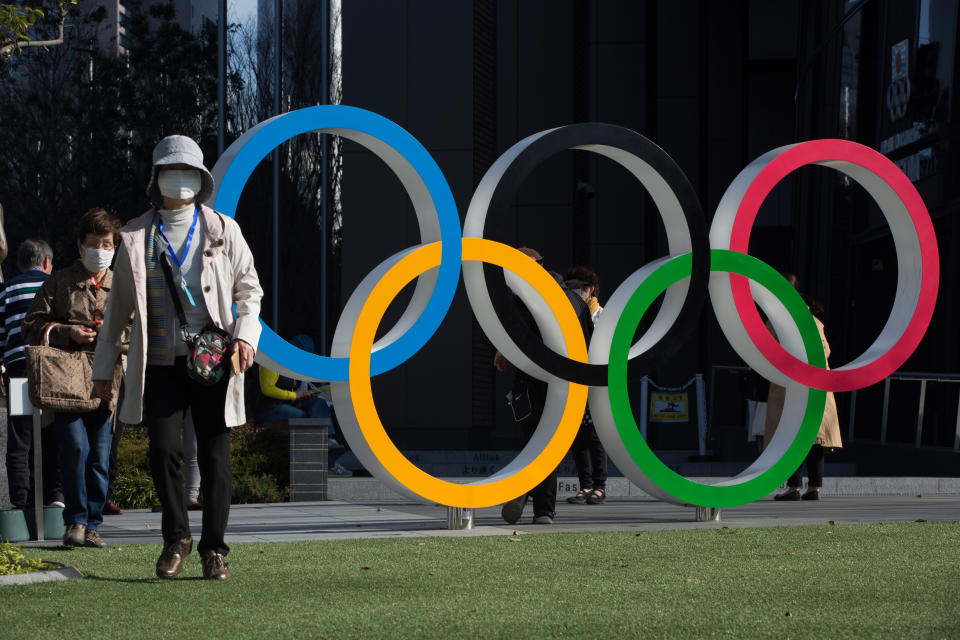Coronavirus: The IOC's Olympic ideal — cash over safety?
The International Olympic Committee held a global teleconference on Wednesday to reassure athletes, representatives, national organizing committees and anyone else about the 2020 Summer Games, which are scheduled for this July in Japan.
As it tends to go with the IOC, it seems the only thing that was reassured is that the IOC wants to hold the Games … and cash the checks, of course.
These are, clearly, unprecedented times. It isn’t the IOC’s fault that a global pandemic struck. As such, no one is expecting concrete answers on an Olympics that is still months away. Cancellation or postponement seem likely, but there is no need to eliminate hope. Time will tell.
If that was the tone of the call, then perhaps there would have actually been a "reassurance." Instead, according to people on the call who spoke to The New York Times, it was a dismissive, hardline and even ridiculous endeavor.
At one point, a representative from Europe reportedly declared, "You have to remember, this is not a deadly disease."
When the IOC’s own medical director didn’t counter that opinion, the chairman of the Canadian Olympic Athletes’ Commission, Seyi Smith, stepped up.
"I just want to reiterate with everyone on the call that this is a deadly disease and that second deaths and overloading the medical system are the issues here," Smith said. "And we need to take this seriously."

Namely, even if COVID-19 won’t kill the best athletes on the planet — almost all of them young and healthy — the chances of spreading the virus with public training or wasting precious healthcare resources on them, rather than those more at risk, is simply foolish.
"It would have been great if they came on and said, ‘This is the biggest pandemic of our time, and we’re going to use our funds and influence to ensure that every country understands the importance of self-isolation, and while the Games can still happen, our No. 1 priority is the safety of the Olympic athletes and their families, alike,’ " Smith said. "I’m trying to be fair and give people the benefit of the doubt, but that was not explicitly stated."
It would be great if they said that, but this is the IOC, which seems to spend its time battling with FIFA as the most corrupt and money-hungry sporting organization in the world.
And that’s part of the IOCs problem as the days tick away to the scheduled start of the Games. The organization has little-to-no credibility and is seen by many as just a cash-grab, bribe-rich, bottomline-focused group. Almost anything it says is met with suspicion.
The issues headed into these Olympics are profound. Will the virus be contained enough in Japan to hold sporting events? Can fans attend? Even if it is safe there — a major if — is it a good idea for that country to invite people from all corners of the globe?
Can it be postponed until later in 2020, or even a year later in 2021? Logistics are extremely complicated — facilities like the athletes village are set to become housing in the fall. What happens to those deals?
Could you scale back the Games in 2021 and limit the number of non-essential participants, such as coaches, support staff and media? The world’s current status isn’t unlike a major war — and during wartimes the Olympics weren’t always the Olympics we know now.
Both the 1940 and 1944 Summer Olympics were cancelled and the 1948 Games in London were dubbed "the Austerity Games" where every penny was pinched.
The IOC isn’t much for pinched pennies.
Moreover, there is mass confusion and challenges for athletes to even prepare for the upcoming Games. Gyms are closed. Pools are closed. Travel is limited. And that’s in the United States. In Europe and other spots there are strict quarantines in place. How does an Italian or Spanish or Iranian athlete train? Could they even compete? Would it be safe?
"Our sports people cannot train, and to celebrate the Games [as planned] would result in unequal conditions," the head of the Spanish Olympic Committee stated.
Is that fair? Does "fair" even matter now? Is "fair" even attainable? Is there another option or options?
That’s what athlete representatives on the call were looking to hear from the IOC, an acknowledgement of sorts that this is a challenge unlike any other. They sought something like NBA commissioner Adam Silver trying to be as transparent and caring as possible as he faces questions with no easy solutions for his suspended league.
No one expected a definitive answer. Yet they felt like they got one.
It’s the IOC blindly barreling into the great unknown, business as usual.
Of course it is. Business is almost all that ever matters with the IOC.
More from Yahoo Sports:
